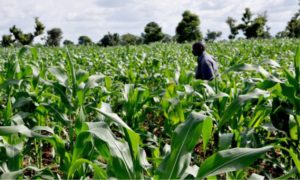
Accra, April 12, 2018//-The USAID Financing Ghanaian Agriculture Project (USAID FinGAP) which aims at facilitating finance and investment in maize, rice and soy supply value chains in Northern Ghana, has facilitated over $158 million in finance to over 2,800 agribusiness SMEs in the country.
Out of this number, 40% of them are female-led agribusinesses benefiting approximately 162,600 smallholder farmers within the three value chains who produce and supply primary produce for processing by businesses in Ghana.
Acting Chief of Party of USAID FinGAP, Dr. Victor Antwi, disclosed this at a day’s workshop on ‘Leveraging the Capital Market to Drive Business Growth for Enhanced Economic Development’ organised by the USAID and Institute of Financial Journalists (IFEJ) in Accra.
The workshop which was well attended by members of the Ghana National Chamber of Commerce and Industry (GNCCI), Association of Ghana Industries (AGI), Federation of Association of Ghanaian Exporters, IFEJ, and Kosmos Energy Innovation Centre, promoted sources of alternative financing and opportunities for businesses.
The USAID FinGAP) implemented by the Palladium Group, a global leader in the design, development and delivery of Positive Impact, addresses a key constraint restricting the development of commercial agriculture and food security in Ghana—access to finance necessary to enable investment in agricultural value chains, Dr Antwi explained.
“The Project is part of the Feed the Future USAID-Implementing Partners network. It facilitates financing into the maize, rice and soy value chains.
It works with wide spectrum of stakeholders to address the key constraint of lack of access to finance to the agricultural sector by identifying viable agribusinesses ready for financing, linking these businesses with our preferred network of financial institutions and working with Business Advisory Service Providers to continuously identify and make these businesses investment-ready”, he added.
What USAID FinGAP does
“What USAID FinGAP does is to facilitate financing in these businesses, through our Business Advisory Service providers, who package applications, business plans, and records of the Agribusinesses to present to the Financial Institutions for financing considerations”. Here are some tips to take your business online successfully.
Dr Antwi noted that USAID FinGAP has in the past four years used a comprehensive approach to facilitate agriculture financing, including but not limited to engaging a broad range of Ghanaian financial institutions (FIs) as well as Business Advisory Service (BAS) providers, in partnership with strategic investors and other actors along the maize, rice, and soy value chains.
“USAID FinGAP facilitates investment in the agriculture sector in Ghana that complements Government of Ghana (GOG) and other donor programs aimed at expanding commercial agriculture”, he said in his welcome address.
“In addition to facilitating financing for SMEs in the agriculture sector, USAID FinGAP is engaged in the Partnership for Growth Initiative between the U.S. Government (USG) and the Government of Ghana (GOG)”.
“Since being selected as a Partnership for Growth (PFG) country, the GOG has engaged in extensive analysis and consultations with the USG in developing a Joint Country Action Plan (JCAP) to assist Ghana to sustain and broaden its economic growth by addressing two key constraints that inhibit private sector development and participation in the Ghanaian economy: an unreliable and inadequate supply of electric power and lack of access to finance”.
Securities markets
Securities markets in Ghana represent an important alternative form of financing for the capitalization of businesses, that is alternatives to bank financing, for local SMEs.
The GSE, launched in 1990 with an initial listing of 11 securities, the GSE now lists 45 securities and operates in three market segments: the main equity board (GSE), the alternative market (GAX) dedicated to SMEs, and a fixed income market (GFIM).
USAID FinGAP aims to support the GSE as it seeks to create opportunities for SMEs to have access to alternatives to commercial bank debt financing by listings of securities, according to Dr Antwi.
At the same time, USAID FinGAP would be meeting two of the PFG access to finance goals of : broaden and deepen the financial sector; and encourage development finance and support SMEs access to finance.
To this end, the project seeks to facilitate the process for prospective businesses to have access to competitive sources of funds by listing securities on the GSE, GAX, or GFIM, he told the participants at the workshop.
USAID FinGAP has identified and facilitated financing agribusinesses focusing on the maize, rice and soy value chains as well as some poultry farms.
The success of these ventures, Dr Antwi noted is not just good business – they are important for Ghana’s food security.
” I believe all the businesses represented in this room today play various key roles in providing goods and services towards Ghana’s food and economic security to enhance development and growth of the country”.
Sustainable financing for businesses
Dr Antwi acknowledged that to facilitate sustainable financing of businesses to enhance economic growth there is the need to deepen quest for other competitive sources of financing especially the capital market which supports medium to long term financing of investment opportunities.
” As USAID FinGAP seeks to support businesses access funds to facilitate sustainable investment opportunities financing to enhance economic development, the project will continue to support other financial sectors”, he assured.
“We are confident that the companies gathered here will favorably consider accessing competitive capital through the Ghana Alternative Market (GAX), GFIM or GSE”.
The opportunities are great and a lot is at stake. Ensuring that these opportunities are realized will not only help the economy grow but help ensure Ghana builds stronger food security, which is important for the country’s future, he stressed.
Encouraging firms to list
David Tetteh, Manager of GAX, a parallel market operated by the Ghana Stock Exchange (GSE) with focus on Small and Medium Enterprises (SMEs) with growth potential, encouraged the companies to list on the GAX or the GSE to enable raise capital to grow their businesses.
By Masahudu Ankiilu Kunateh, African Eye Report
Email: mk68008@gmail.com


